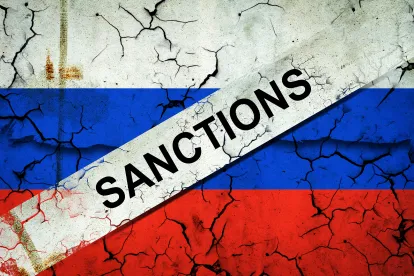The EU is going extraterritorial, and it is doing so through private contract. It is a pretty neat trick.
As a general rule, EU regulations do not apply extraterritorially. This policy is a bit pointed, intended to stand in sharp contradistinction to the U.S. sanctions regulations that are enforced around the world (and for which the EU has issued certain blocking statutes, as it did in the case of U.S. sanctions on Cuba). However, the new “No Russia” Clause the EU recently imposed is giving EU restrictions on Russia a much longer arm.
The ‘No Russia’ Clause: A New Dimension in EU Restrictive Measures
The Sanctions Package
On December 19, 2023, the EU released its 12th sanctions package in response to the ongoing geopolitical tensions with Russia. Among the new restrictions, the introduction of the ‘No Russia’ Clause requirement under a new Article 12g to Regulation (EU) No 833/2014 (the “Regulation”) is of particular interest.
The ‘No Russia’ Clause aims directly at preventing the circumvention of EU export bans through third countries. A third country is a non-EU Member State, excluding “partner countries” that include NATO allies and other countries that maintain similar restrictions on Russia.
The Critical Clause
Under Article 12g of the Regulation, EU exporters must contractually prohibit the re-export of certain sensitive goods to Russia. The provision targets specific goods related to sectors such as aviation, jet fuel, and firearms, among others, specified in Annexes XI, XX, and XXXV to the Regulation (altogether the “covered sensitive goods”).
EU exporters must also ensure that “adequate remedies” are contained within these contracts in the event of a breach of the ‘No Russia’ clause by a contracting party.
Finally, EU exporters are also required to notify their local national competent authority as soon as they become aware of a breach of the clause.
The Essential Dates
Starting from March 20, 2024, EU exporters must ensure the contractual obligations stated in Article 12g are in place in the contracts that they have concluded or entered into since December 19, 2023. Contracts that were concluded or entered into prior to December 19, 2023, benefit from a one-year transition period where the requirement applies to the older contracts only after December 20, 2024 or at the contract’s expiry, whichever is earlier.
A Welcomed (if Limited) Insight : EU Commission Guidance
The recent FAQ guidance has addressed some points of ambiguity that had been identified in the ‘No Russia’ clause. The FAQs aim at clarifying the purpose of Article 12g, provide a template for incorporating the “No Russia” clause in contracts and detail further the verification procedures of the obligation. The guidance also highlights the necessity for EU exporters to place strong due diligence frameworks and embed sufficient remedies within contracts to manage and rectify any potential infringements effectively.
The recommended clause under the FAQ is drafted as follows:
(1) The [Importer/Buyer] shall not sell, export or re-export, directly or indirectly, to the Russian Federation or for use in the Russian Federation any goods supplied under or in connection with this Agreement that fall under the scope of Article 12g of Council Regulation (EU) No 833/2014.
(2) The [Importer/Buyer] shall undertake its best efforts to ensure that the purpose of paragraph (1) is not frustrated by any third parties further down the commercial chain, including by possible resellers.
(3)The [Importer/Buyer] shall set up and maintain an adequate monitoring mechanism to detect conduct by any third parties further down the commercial chain, including by possible resellers, that would frustrate the purpose of paragraph (1).
(4) Any violation of paragraphs (1), (2) or (3) shall constitute a material breach of an essential element of this Agreement, and the [Exporter/Seller] shall be entitled to seek appropriate remedies, including, but not limited to:
(i) termination of this Agreement; and
(ii) a penalty of [XX]% of the total value of this Agreement or price of the goods exported, whichever is higher.
(5)The [Importer/Buyer] shall immediately inform the [Exporter/Seller] about any problems in applying paragraphs (1), (2) or (3), including any relevant activities by third parties that could frustrate the purpose of paragraph (1). The [Importer/Buyer] shall make available to the [Exporter/Seller] information concerning compliance with the obligations under paragraph (1), (2) and (3) within two weeks of the simple request of such information.
Taking a (short) Moment to Reflect: EU Restrictive Measures First Attempt at Extraterritoriality[1]
The No Russia clause is already impacting EU exporters as they scramble to update their agreements to meet the deadlines. But the bigger takeaway here is that, while the EU is imposing a requirement on exporters within its jurisdiction, it is using the private contracts of those exporters to push its policies and requirements outside the territory of Europe.
For example, if a German company exports an item to China, there may not be a rule in China prohibiting the export of that item to Russia. So a typical contract clause requiring compliance with local laws would not keep the Chinese company from reexporting the German-origin item to Russia. In order to push that prohibition out of the EU and into China, the EU regulators have (cleverly, we must admit), issued requirements that the contract expressly prohibit the non-EU party from activity (reexport to Russia) that the EU cannot impose directly on the Chinese company.
Further, by requiring that the contract contain adequate measures to penalize a breach of the “No-Russia” clause, the EU has extraterritorialized[2] the penalties that and enforcement of the extraterritorial restriction. And, again, the EU has pushed out this restriction and its enforcement through private contract.
So… What’s next?
In light of the new provision and recent FAQ guidance, there are a number of action points that EU exporters may or should already be taking:
- Ensure that you have incorporated a ‘No Russia’ provision into every contract for the supply of covered sensitive goods outside of the EU or the listed partner countries,[3] save for those that were entered into prior to December 19, 2023 and that will have been executed/implemented by December 20, 2024;
- Prepare your new contractual terms for incorporation of the ‘No Russia’ clause; and
- Consider adequate measures aligned with your business and risks profiles.
As ever, we’d invite any of our readers to get in touch to discuss the larger implications of this subtle but critical shift in the application of policy. We had the chance to speak at an EU Trade Controls conference this past week and the discussion among impacted exporters was fascinating. We are eager to see how this new tool in the regulators’ toolbox may be put to work in other scenarios. We will, of course, report here as these matters develop.
Claire Le Tollec also contributed to this article.
FOOTNOTES
[1] Some of the authors of this post also engage in teaching, and they would like to preemptively apologize for getting a little academic in this paragraph.
[2] It is not clear that this is a real word, but the authors humbly submit that it should be.
[3] As of the date of publication of this article, this list includes the USA, Japan, the UK, South Korea, Australia, Canada, New Zealand, Norway and Switzerland
Listen to this article here.





 />i
/>i
